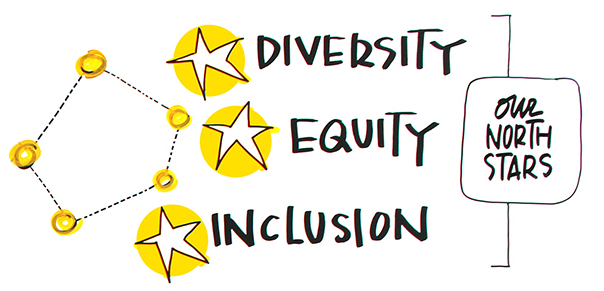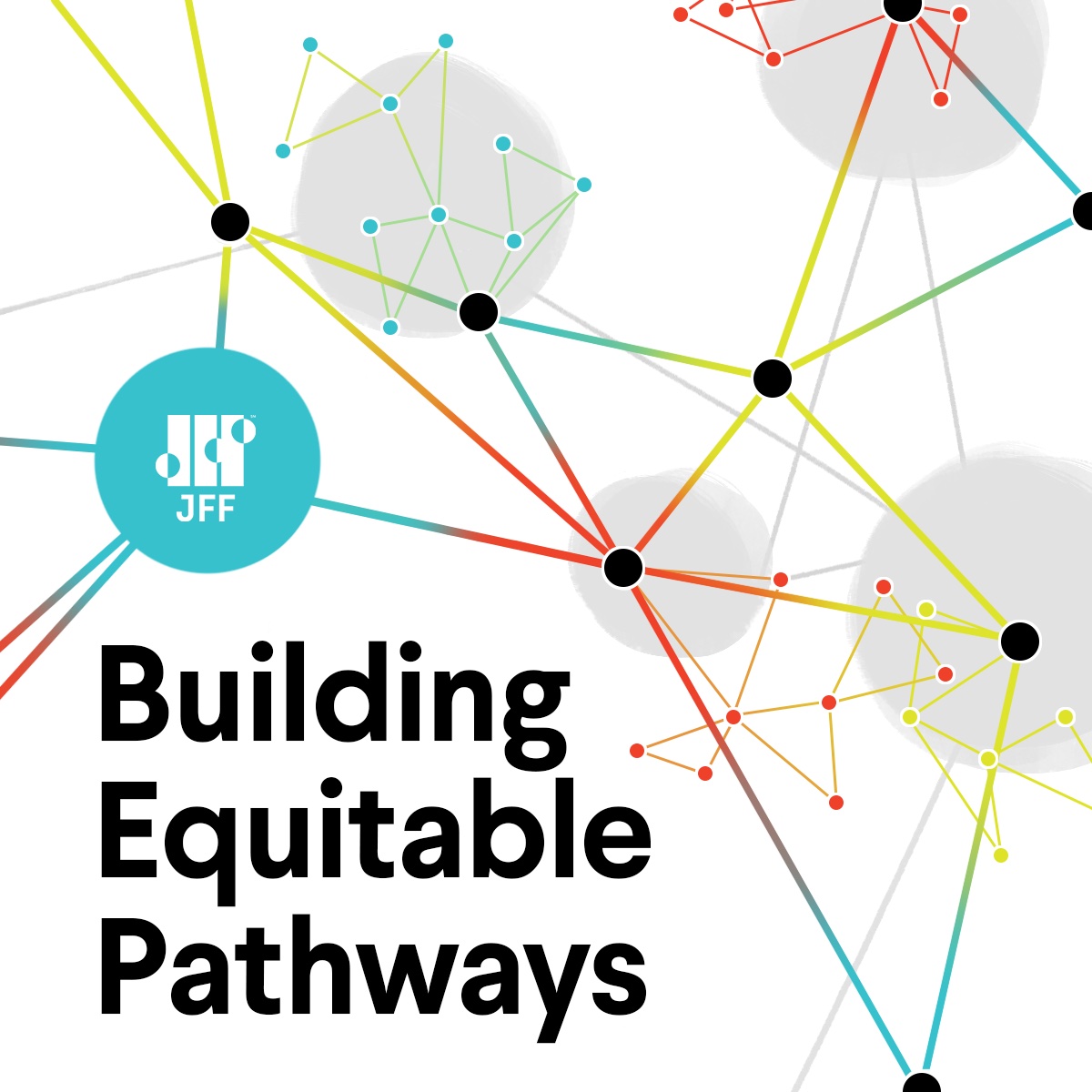

Building Equitable Pathways
July 22, 2023
At a Glance
Building Equitable Pathways is a community of practice working to create equitable pathways systems so that more Black and Latinx youth and young people experiencing poverty succeed in college and their future careers.
Our Goals
Driving Equity
Building Equitable Pathways strives to improve our education and workforce systems so that all young people can move seamlessly and successfully from high school to college, career, and beyond.
A deep commitment to equity stands at the heart of Building Equitable Pathways. This work aims to ensure that, at every stage and key transition point in their lives, Black and Latinx youth and young people who are experiencing poverty can access the knowledge, skills development opportunities, support, and relationships necessary to thrive in education and in the workforce.
Building better, more equitable college and career pathways systems, and supporting and uplifting the organizations that make them possible, is an important part of how we can make that happen.

Changing Systems
Building Equitable Pathways is a community of practice with 14 innovative intermediary organizations, JFF, the Bill & Melinda Gates Foundation, Bloomberg Philanthropies, and the Walton Family Foundation.
Intermediaries bring together key players and mobilize cross-sector partnerships to advance equitable pathways. They connect leaders in K-12 education, postsecondary education and training, industry, and government to forge partnerships, craft strategies, and secure funding to develop high-quality college and career pathways.
Together, we seek to increase our individual and collective capacity to change our education and workforce systems for the better. We will identify best practices, create tools, and develop a theory of action to support the efforts of high-quality intermediaries to transform our systems and scale and sustain equitable pathways. We aim to drive engagement across these systems, improve their sustainability, and ultimately, influence more equitable student outcomes in academics and careers.
Building Equitable Pathways focuses on the role intermediaries play in three key areas: facilitating racial equity in the design and scaling of college and career pathways, advocating for policy solutions, and building strong data and infrastructure practices.
Racial Equity
We aim to advance a vision for racial equity in pathways systems by implementing anti-racist practices and policies that affect the lived experiences of youth and the adults working to support them.
As the connector within a pathways ecosystem, intermediaries are uniquely positioned to facilitate the reimagining and creation of equitable pathways systems that truly support all young people in their efforts to succeed in college and careers.
Policy and Advocacy
We aim to cultivate and mobilize the policy expertise and advocacy capacity of intermediaries so they can more deeply influence their policy environments and create a groundswell of collective policy action nationally.
Intermediaries are uniquely positioned to influence policy because they have a commitment to equity and the ability to bring together—and learn from—a diverse set of partners.
Data and Infrastructure
We aim to build strong data and infrastructure practices to facilitate efforts to collect, monitor, analyze, and act on data to support equitable outcomes in pathways ecosystems.
By focusing on their data collection and infrastructure strategies, intermediaries can better shape, advocate for, and evaluate policy and equity solutions.
Our Partners
The 14 intermediary organizations in this initiative are working to strengthen national systems of high-quality college and career pathways to better serve Black and Latinx youth and young people who are experiencing poverty.














We also want to thank and recognize the contributions of the first Building Equitable Pathways cohort: Boys and Girls Club of Greater Memphis, Brooklyn Navy Yard, Career Connect Washington, CareerWise Colorado, HERE to HERE, Rush University Medical Center, YouthForce NOLA, Equal Measure, Mission Minded, and Square Button. Their partnership, expertise, and support were key to developing the tools and resources that follow.
Blog Series
Learnings and Insights About Racial Equity, Policy, and Data: The Building Equitable Pathways Blog Series shares provocations, insights, and lessons from the partners in the initiative.
We are excited to share the challenges we face, the questions we are grappling with, and the solutions we create through Building Equitable Pathways over the next two years. We hope you will learn with us as we seek to increase our individual and collective capacity to change our education and workforce systems for the better.
Podcast
In the Building Equitable Pathways Podcast by Jobs for the Future (JFF), host Kyle Hartung speaks with leaders from across the country working at the intersection of education, training and workforce development. Together, they discuss the work their organizations are doing to create equitable pathways systems so that more Black and Latinx youth and young people experiencing poverty succeed in college and their future careers.


Building and Scaling Equitable Pathways in Your Region
Leveraging Community Learnings to Drive Systems Change This body of work leverages the collective learnings and experiences of the Building Equitable Pathways initiative to provide curated sets of resources that address some of the most common and…

The Fruit and Root Analysis
Together, the Building Equitable Pathways (BEP) community of practice worked to identify the manifestations of racism and inequity, the “fruit,” and the underlying causes and drivers of inequity, the “roots.” This framework offers a similar…

From Designing Policy Solutions to Building Coalitions
This paper outlines potential actions and roles for intermediaries to facilitate the development and implementation of truly equitable education-to-career pathways systems. Specifically, it could guide the broader field of intermediary organizations and efforts to engage…

Using Data to Advance Equitable Change: An Intermediary’s Guide to Measuring for Equity
Intermediaries work to improve, vertically align, and systematize the components of career pathways. They are also crucial actors in centering racial equity within pathways work—as advocates, designers, and accountability partners. In these roles intermediaries analyze…

Data Enablers: Critical Conditions to Design, Deliver, and Evaluate Equitable Pathways
Data is essential to proving the efficacy of an intervention, demonstrating the need for a new approach, or simply understanding how our individual efforts add up to systems-level trends. In their work designing and advocating…

State Policy Assessment Tool for Building Equitable Pathways
JFF and the Building Equitable Pathways (BEP) Policy and Advocacy strand created an assessment tool that members of the BEP community of practice and organizations throughout the field can use to review existing and proposed…

Building Equitable Pathways Resource Library
This tool provides access to resources that organizations in the Building Equitable Pathways community of practice have found useful in their work. It also features resources Jobs for the Future and BEP members have created…
State Policy Framework for Building Equitable Pathways
This tool was co-created with input from Building Equitable Pathways Community of Practice members, to support their own and others’ policy work. Related Content

How Intermediaries Can Help Black and Latinx Youth Develop a Strong Occupational Identity: Four Principles of Practice
This resource provides four guiding principles that intermediary staff and leaders can use to support equitable career outcomes for youth—particularly Black and Latinx youth and young people who are experiencing poverty. Intermediary organizations—sometimes known as…

Planning Tool for Building Equitable Pathways
This planning tool will allow your organization to plan, partner, and do the work necessary to become a more effective intermediary in your unique context. Intermediary organizations are critical to offering college and career pathways…

Equitable Pathways Hypotheses Spotlights
The Building Equitable Pathways hypotheses guide the development of pathways that equitably support all young people, especially youth of color and youth who are experiencing poverty, in building rewarding and successful futures. Learn what the…

Intermediary Functions and Features in Pathways Systems
This resource clarifies the roles intermediaries play in college and career pathways systems. It can be useful for envisioning a brand-new organization or strengthening the intermediary functions of an existing organization. Your organization can use…

From Labor Market Information to Pathways Designs: Foundational Information for Intermediaries
This resource is designed to help intermediaries effectively design strong college and career pathways. It lays out key areas and provides guidance about and examples of how to distill this information in order to share…

Intermediaries’ Role in Policy to Develop and Scale Equitable Pathways
This brief illustrates the power intermediaries have to influence policy, so they can be more effective in supporting their partners and driving positive change in their communities and across their states. Learn more about…

An Intermediary’s Guide to Working with Higher Education Partners
This guide supports intermediaries and their community college partners in forming productive and lasting relationships. The goal of these partnerships is to provide high school students with opportunities to earn college credits that will help…

The MOU: A Tool for Formalizing Partnerships
Intermediaries can use memoranda of understanding (MOU) to better fulfill their roles as connectors among partners working to provide college and career pathways. This easy-to-use guide describes the purpose of an MOU, outlines the process…

Intermediary Communications: How to Stand Out While Working Together
Developed by Mission Minded in partnership with JFF and the Building Equitable Pathways partners, this guide provides intermediaries with best practices in communications along with tools and sample messages to help them stand out and…
Labor Market Information 101: Key Terms and Ideas to Consider
Related Content

JFF Leads National Coalition to Improve Equity in Postsecondary and Career Pathways
September 15, 2021
Watch: Building Equitable Pathways Webinar Series
Launched in 2019, the Building Equitable Pathways initiative brought together JFF and seven leading intermediary organizations to support Black and Latinx youth and young people experiencing poverty in exercising self-determination and building rewarding and engaging…
